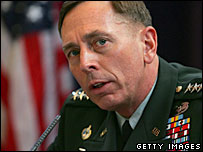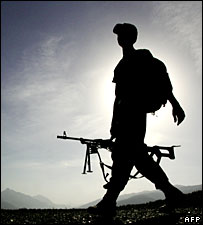
Tuesday, 23 October 2007
The top US military commander in Iraq, Gen David Petraeus, tells BBC diplomatic correspondent Jonathan Marcus of his fears about a possible Turkish raid in the autonomous Kurdish region of Iraq.

There was no doubting the concern of Gen Petraeus about a potential Turkish incursion into the country.
Turkish forces, he said, had sustained some terrible losses. He clearly hoped that such an operation could be avoided, not least because of the predicament in which it would place the US.
"First of all, the Turkish forces are our long-time allies," he said.
"We are in direct communication. We have very close liaison. We talk to counterparts there. I did talk in recent days with a very senior Turkish officer. This is an exceedingly difficult position for us.
"We have a Nato ally on one side and on the other side, of course, another ally with whom we are engaged in fighting difficult insurgent enemies."
Gen Petraeus spoke of his hope that those with ties to Kurdish PKK rebels would convey to them the seriousness of the situation; to get them, as he put it: "To step back off the ledge and not to make the situation worse than it is."
He also left open the possibility that "some may have an objective of trying to provoke the Turkish forces into carrying out an action and, of course, that is a concern".
Gen Petraeus was inevitably cautious. Like all senior officials, he was reluctant to be drawn into the analysis of hypothetical situations.
Supposing the Turkish military did mount an operation across the border, I asked, what would happen then? Was there a danger of a direct confrontation between US and Turkish forces?
Gen Petraeus stressed the extraordinary difficulty of the largely mountainous terrain in the area - what he described as essentially a "tri-border region" straddling Turkey, Iraq and Iran.
As to a confrontation between the US and one of its principal regional allies, he said this was an unlikely scenario.
"I wouldn't want to try to presume to say how limited a Turkish operation would be," he said.
"But if you know where the camps are, if you know the terrain, if you are aware of that situation, that hypothetical you laid out is unlikely."

Gen Petraeus was also at pains to stress the extensive economic ties that had developed across the border between Turkey and northern Iraq.
"On many days there will be a line of trucks stretching anywhere from four to seven miles (6-11km)," he said.
"Thousands of trucks cross that border each day."
He said the level of investment by Turkish firms in northern Iraq was somewhere between $8bn and $10bn (£4bn and £5bn) in recent years.
"There is an enormous amount of construction going on in Iraqi Kurdistan," he said.
"Much of that construction is being carried out by Turkish firms and much of the goods and service are from Turkish firms.
"There is an electricity-sharing agreement, so the economic and commercial ties between the two countries, including the Kurdish region, are of great significance, and that's another factor that argues against the hypothetical that you were suggesting earlier."
Overall, Gen Petraeus sought to present a picture of an Iraq where the level of violence, while still too high, is coming down.
But progress is unlikely to be speedy.
"There is nothing quick or easy about Iraq," he said. "Iraq is hard."
And clearly the last thing the general needs is greater instability in the north, which, until now, has been one of the few success stories highlighted by the Bush administration since its toppling of Saddam Hussein.


